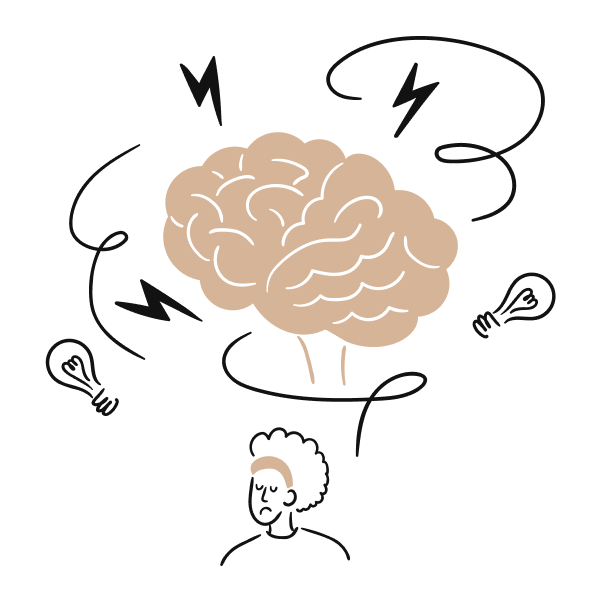If you have a panic disorder, you experience fear of recurring panic attacks and you change your behaviour because of this fear. It can affect your daily life, for example because you avoid places or situations. Learn more about causes, symptoms and how to cope with panic disorder.
What is panic disorder?
What are the symptoms of panic disorder?
- Palpitations or a strong pounding heart;
- Sweating;
- Hyperventilating;
- Tingling in arms and legs;
- Nausea/vomiting;
- An unpleasant or painful feeling in the chest;
- Trembling and/or trembling;
- Dizziness, feeling of fainting;
- Cold chills or hot flashes;
- A numb or tingling sensation in your fingers;
- Feelings of breathlessness or suffocation;
- Feeling unreal (derealization) or feeling detached from yourself (depersonalization);
- Fear of going crazy and losing self-control;
- Fear of dying.
Panic disorder and agoraphobia
Agoraphobia often occurs in combination with panic disorder. In agoraphobia, you have a distinct fear of two or more of the following situations:
- Using (public) transportation;
- Being in an open space;
- Being in an enclosed space;
- Standing in a line or crowd;
- Standing alone outdoors.
You fear or avoid these situations because of the thought that escape is difficult or that help is not available. Not everyone with panic disorder also suffers from agoraphobia.
What is the difference between panic disorder and other anxiety disorders?
What are the causes of panic disorder?
It is not always clear what causes recurrent panic attacks. There are several possible causes and it varies from person to person. However, there are some factors in which panic disorders are more common:
- Genetics
There may be a genetic factor if anxiety or panic symptoms are more common in your family. - Major life events
Panic attacks sometimes occur after you have experienced a major life event. Examples include having to say goodbye to someone close to you, being overworked or the end of a relationship. - Lifestyle
An unhealthy way of life, increases the risk of panic disorder, especially: little relaxation, little exercise, lots of stress. A lot of caffeine, alcohol or drugs also intensify the physical symptoms of anxiety. Sometimes this leads (again) to a panic attack. - Childhood
The way you deal with anxiety is partly learned. Perhaps one of your parents was anxious or overprotective? If so, it is more likely that you will also become more susceptible to anxiety and panic attacks. You may learned to want to control everything or to leave difficult situations to others. This doesn’t help. - Personality
People with neuroticism (tendency toward emotional instability) are more sensitive to stress, experience ordinary situations as threatening more quickly, and they have more difficulty dealing with setbacks and frustrations. - Psychological
Your cognitive perceptions, or the glasses through which you look at life, play a role in the development of panic disorder. The coping strategies you use in fearful situations also matter.
Fear has a protective function
Angst is een heel normaal en gezond verschijnsel van het lichaam. Het heeft een beschermende functie. Angst waarschuwt ons voor mogelijk gevaar. Om de overlevingskans te vergroten geeft het lichaam liever een vals alarm dan dat het gevaar over het hoofd ziet.
Om deze reden is er bij het voelen van angst niet altijd daadwerkelijk gevaar. Jij kunt de lichamelijke sensaties die je ervaart bij angst moeilijk plaatsen. Deze sensaties voelen onaangenaam waardoor je mogelijk geneigd bent meer te vermijden of veiligheidsgedrag in te zetten. [3]
Waar kan een paniekstoornis tot leiden?
Een paniekstoornis kan een grote impact hebben op je leven. De gevolgen zijn bijvoorbeeld:
- Vermijding
Je vermijdt situaties of plaatsen uit angst voor paniekaanvallen. Vaak zijn dit ook leuke dingen. Zoals het maken van reizen of het bezoeken van vrienden. - Schaamtegevoelens
Veel mensen met paniekaanvallen schamen zich hiervoor. - Somberheid
Sombere gevoelens ontstaan bijvoorbeeld omdat je het gevoel hebt niet hetzelfde leven te kunnen leiden als mensen zonder paniekaanvallen. Je mist leuke dingen en hebt het gevoel stil te staan. - Sociaal isolement
Als je vervalt in vermijding, ga je minder vaak leuke dingen doen met je vrienden en kom je misschien niet meer op feestjes. Vriendschappen verwateren en je raakt in een sociaal isolement. - Slechter slapen
Als je stress, piekergedachten en/of spanning ervaart is het lastiger om te ontspannen. Dit zorgt ervoor dat je moeilijker in slaap komt. - Stoppen met sporten / minder bewegen
Uit angst voor de lichamelijke sensaties. - Minder goede concentratie
Als je je zorgen maakt, heeft dat je aandacht. Het neemt onbewust veel ruimte in beslag in je gedachten. Dit maakt het lastiger om je te focussen op een taak en concentreren is lastiger.
Adviezen bij een paniekstoornis
Heb je een paniekstoornis? Voor zowel jou als voor je naasten is er een aantal tips en adviezen over wat je kunt doen als jij last hebt van steeds terugkerende paniekaanvallen.
Tips bij een paniekstoornis – voor mij
- Blijf niet met de paniekklachten rondlopen, maar zoek hulp
Neem iemand in vertrouwen en praat erover. Maar neem ook contact op met je huisarts of een psycholoog. - Vermijden helpt je niet
Hoewel dit erg moeilijk is, is het beter voor je om niet in vermijding te vervallen. Dit houdt je angst namelijk alleen maar in stand. - Stilstaan bij de angstgedachte
Is jouw angstgedachte – die je had tijdens een paniekaanval – uitgekomen? Nee? Reflecteer wat er wel is gebeurd en zet dit als realistischere gedachte tegenover de angstgedachte. - Inzicht in veiligheidsgedrag
Inzicht krijgen in wat jij doet om paniekaanvallen te voorkomen helpt ook. Je kunt hier zelf eens over nadenken, maar ook therapie helpt jou ontdekken wat voor veiligheidsgedrag jij vertoont en wat je nu allemaal vermijdt uit angst voor paniekaanvallen.
De volgende adviezen gelden als algemene leefstijladviezen die goed voor je zijn. Deze adviezen hebben niet als doel om paniek te voorkomen.
- Zorg goed voor jezelf
Dat betekent dat je genoeg beweegt; voldoende slaapt en gezond eet. Beperk alcohol- en cafeïnegebruik. Je kunt natuurlijk wel ergens koffie drinken als onderdeel van een sociale situatie aangaan.
- Structuur in je dag aanhouden
Eet op vaste tijden en ga iedere dag om dezelfde tijd naar bed. Sta ook op een vast tijdstip weer op.
- Zoek afleiding met ontspannende activiteiten
Voldoende ontspannen is belangrijk om je stressniveau omlaag te brengen. Let op: zet dit niet in als vermijding.
Heb je toch een paniekaanval?
Besef je dat de angst altijd weer wegzakt. Je lichaam en hersenen zijn simpelweg niet in staat om langdurig in deze ‘hoogste staat van paraatheid’ te blijven. Wil je graag weten wat je kunt doen bij een paniekaanval? Lees hier meer over wat je kunt doen als je toch een paniekaanval hebt.
Tips voor een partner of dierbare (en mij)
- Wees er voor je naaste met een paniekstoornis. Praat erover met elkaar en zorg dat hierover geen schaamte hoeft te bestaan.
- Ondersteun of stimuleer niet het vermijdende gedrag van je naaste.
- Stel hem of haar gerust op het moment dat een paniekaanval optreedt.
- Naast het bieden van geruststelling kun je vragen waar je partner of naaste op het moment van een paniekaanval behoefte aan heeft. Soms is aangeven waar de behoefte ligt lastig voor mensen die in paniek zijn. Stimuleer je partner om te praten over zijn of haar gevoelens op dat moment.
Is een paniekstoornis te behandelen?
Een paniekstoornis is goed te behandelen. Met zowel therapie als met medicijnen zijn goede resultaten te behalen.
Hoe wordt de classificatie gesteld?
Een psycholoog of psychiater kan de classificatie paniekstoornis stellen. Je hebt een paniekstoornis als je minimaal een maand na één van de paniekaanvallen nog last hebt van angst voor nieuwe paniekaanvallen. Of als je gedragsveranderingen vertoont ter voorkoming van paniekaanvallen en als het veel impact heeft op je beroepsmatig en sociaal functioneren.
Hoe wordt een paniekstoornis behandeld?
Een paniekstoornis wordt behandeld met therapie en in sommige gevallen met medicatie. Of met een combinatie van beiden. De voorkeur gaat uit naar Cognitieve Gedragstherapie. In therapie leer je dat je de angst zelf aankan en leer je met jouw paniekgedachten omgaan.
Behandeling van een paniekstoornis met therapie
Cognitieve gedragstherapie (CGT) is de meest gebruikte vorm van therapie bij paniekstoornissen. Bij deze behandeling:
- Krijg je inzicht in jouw paniekgedachten en leer je er alternatieve gedachten tegenover te zetten;
- Leer je je angstige gedachten uit te dagen. Je leert de angst aan te gaan en te kunnen door blootstelling aan lichamelijke sensaties of blootstelling aan situaties die voor jou paniekaanvallen oproepen. Zo leer je dat er niets ernstigs gebeurt en je de lichamelijke sensaties aankunt.
Acceptance and Commitment Therapy (ACT) is andere vorm van therapie die ook wordt toegepast bij paniekstoornis. Bij een behandeling met ACT doe je verschillende oefeningen:
Je leert loskomen van de paniekgedachten, de lichamelijke sensaties te verdragen, de focus te leggen op het hier-en-nu en wat je belangrijk vindt in het leven. Je richt je op waar je naar toe zou willen en hoe je wilt dat je leven eruit komt te zien (je bepaalt je waarden).
Help with panic disorder
Do you have questions about panic disorder? Or are you having doubts about when to consult a psychologist?
-
Have you tried many things yourself and you are still experiencing symptoms? Feel free to call us at 085-1308900 or contact us online. This way you can feel if there is a click and if you feel comfortable.
-
At iPractice, you will work with 2 psychologists. Treatment consists of both online contact and regular consultation room sessions at one of iPractice’s locations. Or find more information about the intake and treatment process at iPractice.
-
With a referral letter from the general practitioner and an official diagnosis of a panic disorder according to DSM-5 guidelines, almost every insurer will reimburse the cost. See which health insurance companies reimburse our care.
-
Read the personal story of Emma about her panic disorder and how treatment at iPractice has helped her to recover. Or read all personal stories about anxiety disorders.
Bronnen
[1] Nederlandse vereniging voor Psychiatrie – Folder angststoornis en agorafobie
[2] https://hyperventilatiecoach.nl/blog-en-tips/diverse/concentratieproblemen/
[3] School of Anxiety – Joshua Fletcher
[4] Hyperventilatie coach – concentratieproblemen


 Nederlands
Nederlands
